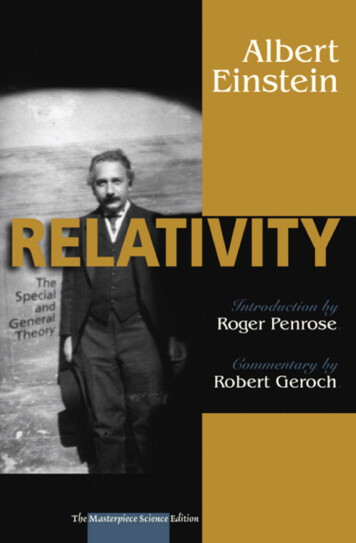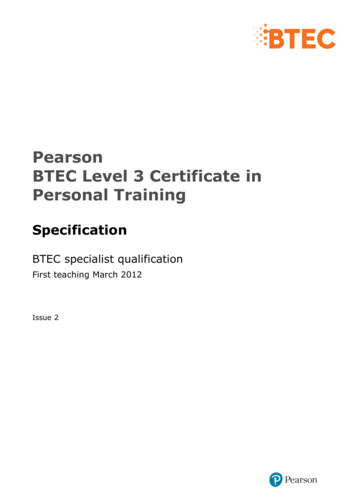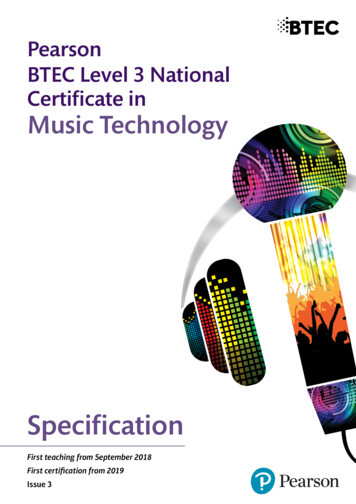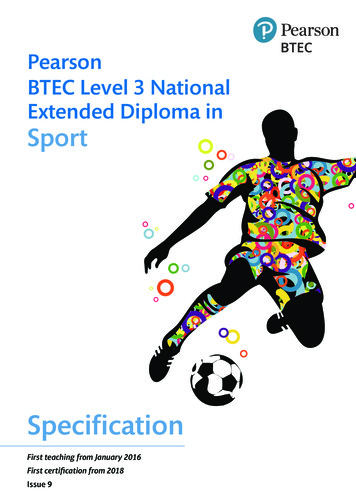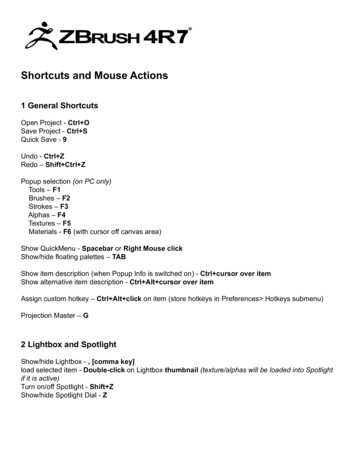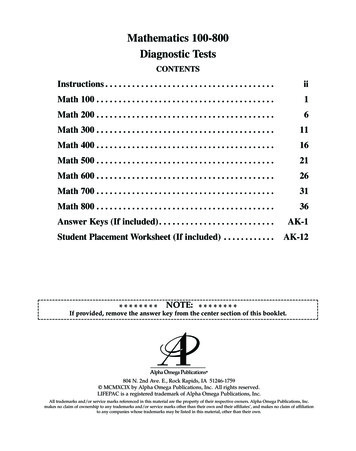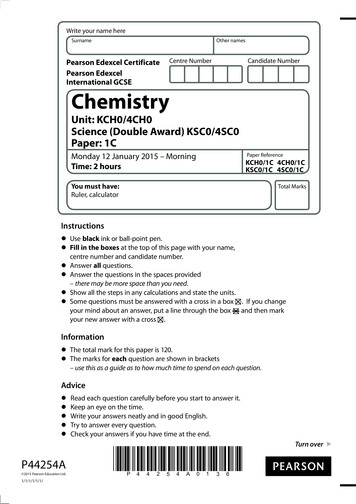
Transcription
Pearson Level 3 End-point Assessmentfor Senior Healthcare Support Worker Mental Health SupportSpecification date: January 2019First assessment date: January 2019
Pearson and apprenticeshipsFor new standards and on-programme learning, Pearson as the UK's largest awarding body is able toprovide a range of qualifications, programmes and assessments, including BTECs that are globallyrecognised and benchmarked. As an approved assessment organisation for end-point assessment for arange of standards, Pearson provides assessment services in line with approved assessment plans. Forfurther information, please visit our website at qualifications.pearson.com. Alternatively, you can get intouch with us using the details on our contact us page at qualifications.pearson.com/contactusAbout PearsonPearson is the world's leading learning company, with 35,000 employees in more than 70 countriesworking to help people of all ages to make measurable progress in their lives through learning. We putthe learner at the centre of everything we do, because wherever learning flourishes, so do people. Findout more about how we can help you and your learners at qualifications.pearson.comReferences to third party material made in this specification are made in good faith. Pearson does notendorse, approve or accept responsibility for the content of materials, which may be subject to change, orany opinions expressed therein. (Material may include textbooks, journals, magazines and other publicationsand websites.)All information in this specification is correct at time of publication.ISBN 978 1 446 95999 2All the material in this publication is copyright Pearson Education Limited 2019
Collaborative developmentPearson has worked in close collaboration with sector experts in developing theassessment tools for this end-point assessment. We are grateful to all who havegenerously shared their time and expertise to help us in the development process.Important informationThis specification has been developed to meet the requirements of the SeniorHealthcare Support Worker (SHCSW) apprenticeship Standard and assessment planthat was approved by the Institute for Apprenticeships (IfA) on 31st October 2016.A subsequent version of the Standard and assessment plan was released by theIfA on 5th September 2018.This EPA should be used to assess apprentices that started their apprenticeshipprogramme before 5th September 2018. Apprentices who start their apprenticeshipprogramme after this date should be assessed via an EPA that is developed to therequirements of the revised Standard.
Contents1234Pearson End-Point Assessments for Apprenticeship Standards1Introduction1The Senior Healthcare Support Worker – Mental Health SupportApprenticeship2Overview2Senior Healthcare Support Worker – Mental Health Support Endpoint Assessment4Structure4Grading5Gateway requirements5Care Certificate6Language of assessment6Preparing apprentices for the end-point assessment7End-point assessment planning and scheduling7Reassessment8Booking reassessment8End-point assessment components9Component 1: Multiple-choice and short-answer test10Component 2: Observation19Assessing performance23Component 3: Interview (supported by learning journal)265Further information and useful publications426Contact us43Annexe A: Gateway Declaration Form44Annexe B: Portfolio Authentication and CertificationDeclaration Form45Annexe C: Direct Observation Record46Guidance on the Direct Observation Record47
1Pearson End-Point Assessments forApprenticeship StandardsIntroductionOne of the most significant changes of the apprenticeship reform in England is theintroduction of an independent end-point assessment.The end-point assessment (EPA) is a synoptic assessment of the knowledge, skills andbehaviours outlined in the Apprenticeship Standard that have been learnedthroughout the apprenticeship programme. The purpose of the end-point assessmentis to make sure that the apprentice meets the standard set by employers and is fullycompetent in the occupation.All apprentices must undertake the independent end-point assessment atthe end of the on-programme phase of training, when their employer and in somecases their training provider, is satisfied that they have met the ‘gateway’ criteria toundertake the assessment. Apprentices will not be awarded the apprenticeshipcertificate until they have successfully completed the end-point assessment.The end-point assessment can be delivered by a registered assessment organisationthat must be independent of the employer or any training provider involved in thedelivery of the on-programme phase of the apprenticeship. All assessment decisionsfor the end-point assessment must be made by the independent assessmentorganisation.Pearson, as a registered assessment organisation, has been working closely withoccupational experts, employers and training providers in the development of endpoint assessment tools to ensure that they are: valid and appropriate to assess occupational competence in the relevant industryand will deliver reliable outcomes fair to all apprentices and help them to make progress in their lives manageable for apprentices and the industry, and can be delivered effectively andefficiently.This specification contains the information needed to prepare apprentices for theSenior Healthcare Support Worker Apprenticeship end-point assessment. (QN603/3915/9)Pearson Level 3 End-point Assessment for Senior Healthcare Support Worker – Mental Health Support –Specification – January 2019 Pearson Education Limited 20191
2The Senior Healthcare Support Worker –Mental Health Support ApprenticeshipOverviewThe end-point assessment in this specification relates to the Senior HealthcareSupport Worker Apprenticeship.The apprenticeship is at Level 3 and is for apprentices working in the role of a SeniorHealthcare Support Worker – Mental Health Support.Senior Healthcare Support Workers help registered practitioners deliver healthcareservices to people 1. They carry out a range of clinical andnon-clinical healthcare and therapeutic tasks under the direct or indirect supervisionof the registered healthcare practitioner, providing high-quality, compassionatehealthcare, following standards, policies or protocols and always acting within thelimits of their competence. Senior Healthcare Support Workers work in a range ofservices, for example hospitals, the community, health- or day-case units, birthcentres, midwifery-led units, someone’s home, operating theatres, nursing and carehomes, assessment centres, hospices, schools, prisons, GP surgeries, charities andvoluntary organisations. They work in partnership with individuals, families, carersand other service providers.Duties are delegated to Senior Healthcare Support Workers in line with care plans 2.Not all duties are routine and support workers will need to use their knowledge,experience and understanding to take decisions within their area of responsibility.They are accountable for their work and for reviewing the effectiveness of theiractions. They undertake the role following a period of experience in healthcare duringwhich they demonstrate best practice and act as a role model. They may supervise orguide the less experienced staff in their team. They will follow the Code of Conduct forHealthcare Support Workers and Adult Social Care Workers.‘People, person or individual’ may include babies, infants, children, young people or adults. Individual options within thestandard may specify an age range that apprentices will be expected to work with.1Care plans/care planning is used throughout this document to include care, therapy, intervention plans, treatment plans orsheets and planning processes. In some instances care plans may not exist or be used.22Pearson Level 3 End-point Assessment for Senior Healthcare Support Worker – Mental Health Support –Specification – January 2019 Pearson Education Limited 2019
Mental Health Support Workers support individuals with mental ill health. They workas part of a multi-disciplinary team offering a range of mental health services. Theysupport individuals and their families at different stages of their illness or recovery bylistening, providing emotional support, developing and reviewing plans to meet theirneeds; observing and reporting changes in their mental and physical well-being;encouraging independence and enabling them to manage their condition and qualityof life. They usually work closely with carers and with other organisations, for examplehousing, social care.The purpose of the end-point assessment is to confirm that the apprentice has metthe required level of knowledge, skills and behavioural standards set by employersand that they are competent in their role as Senior Healthcare Support Worker.The typical duration for this apprenticeship is 18-24 months but this will depend onthe apprentice’s previous experience and access to opportunities to gain the full rangeof competences.The overall apprenticeship is graded as Pass/Merit/Distinction.To achieve the apprenticeship certificate, apprentices are required to completesuccessfully the: on-programme period of training and development, including achieving therequired Maths and English qualifications and the Level 3 Diploma in HealthcareSupport. The apprentice must also complete an induction that meets the15 standards as set out in the Care Certificate 3. end-point assessment (EPA) – Section 3 provides detailed information on the endpoint assessment for this apprenticeship.The certificate for the apprenticeship is awarded by the Institute for Apprenticeships,through a process administered by the Education and Skills Funding Agency (ESFA). Asthe end-point assessment organisation, Pearson will claim the certificate on behalf ofthe apprentices.Employers and/or training providers should familiarise themselves with therequirements of the apprenticeship and communicate these clearly to apprentices.To see the published Senior Healthcare Support Worker Standard and AssessmentPlan, please go to: -standards/Care Certificate: for more details see http://www.skillsforhealth.org.uk/ care-certificate. The Care Quality Commission (CQC)expect that providers that employ healthcare assistants and social care support workers follow these standards to make surenew staff are supported, skilled and assessed as competent to carry out their roles.3Pearson Level 3 End-point Assessment for Senior Healthcare Support Worker – Mental Health Support –Specification – January 2019 Pearson Education Limited 20193
3Senior Healthcare Support Worker – MentalHealth Support End-point AssessmentStructureThe end-point assessment for the Senior Healthcare Support Worker – Mental HealthSupport Apprenticeship consists of the following three assessment components: a multiple-choice and short-answer question test an observation of practice an interview (supported by learning journal).The table below gives a summary of the structure of the end-point assessment.The assessment is agreed with the apprentice and their employer and takes place inthe apprentice’s normal place of work.The assessment takes the following format, although the sequencing of the end-pointassessment components is determined by the employer and assessor to ensure bestfit with local needs: multiple-choice/short-answer test. The apprentice sits the test, which theindependent assessor administers (60 minutes) practical observation. The assessor observes the apprentice in the course of theirnormal work (minimum of 90 minutes) interview (supported by learning journal). The interview takes place between theassessor and the apprentice at the end of the assessment(maximum of 45 minutes).For final certification, the apprentice must have passed all components in theend-point assessment. At the conclusion of the end-point assessment, theindependent assessor collates the evidence and determines the final grading for theapprenticeship. The grading decision is made solely by the independent assessor.There is detailed information about each of these end-point assessment componentsin Section 3.4Pearson Level 3 End-point Assessment for Senior Healthcare Support Worker – Mental Health Support –Specification – January 2019 Pearson Education Limited 2019
GradingThe table below shows how the grade from each end-point assessment component iscombined to determine the overall end-point assessment grade.Multiple-choicetestObservation ofpracticeInterview (supportedby learning journal)Overall nDistinctionThe final judgement on the competency of the apprentice, the grade to be awardedfor each component and the overall grade rests with the independent assessor.Gateway requirementsBefore progressing to the end-point assessment, all apprentices must be signed off bytheir employer through the ‘gateway’. This gateway sign-off confirms that apprenticeshave the level of occupational knowledge, skills and behaviours required to achievethe apprenticeship and that they are therefore ‘ready for end-point assessment’.Employers should only recommend apprentices for end-point assessment when theyare confident that apprentices are ready.The gateway sign-off confirms that all apprentices have: met the 15 standards as set out in the Care Certificate. The Care QualityCommission (CQC) expect that providers that employ healthcare assistants andsocial care support workers follow these standards to make sure new staff aresupported, skilled and assessed as competent to carry out their roles met the stated Level 2 Mathematics and English requirements as these must beachieved before apprentices attempt the end-point assessmentPearson Level 3 End-point Assessment for Senior Healthcare Support Worker – Mental Health Support –Specification – January 2019 Pearson Education Limited 20195
completed the specified regulated Level 3 Diploma in Healthcare Supportoccupational competence qualification completed their learning journal. The apprentice documents and reflects on theirdevelopment (knowledge and skills) as well as their approach to the workplace (thevalues and behaviours). The learning journal is completed during the three monthsleading up to the planned date of the end-point assessment.Employers must complete an end-point assessment Gateway Declaration Form (seeAnnexe A), with the apprentice. The form and the associated gateway evidence will betransferred to Pearson before the end-point assessments take place. The formcaptures the mandatory prerequisites for the end-point assessments and any otherorganisation-specific evidence. The assessments cannot take place unless the relevantinformation and evidence is available.Evidence that the apprentices have met the gateway requirements must be providedto support the Gateway Declaration Form.Care CertificateIn line with the assessment plan set by the trailblazer groups, apprentices must haveachieved all 15 standards of the Care Certificate prior to entering the end-pointassessment gateway. For audit purposes, Pearson requires a signed declaration to beprovided from either the apprentice’s employer and/or training provider to confirmthat this requirement has been achieved. This declaration can be found in Annexe A.The signed declaration and Care Certificate award statement (i.e. summary ofachievement) should be submitted to Pearson as part of the gateway process and willbe stored on internal systems to enable internal and external audit.It is suggested that the apprentice’s Care Certificate evidence is made available at thelocation where end-point assessment activity is being undertaken. This will then allowapprentices to use this information to enhance their interview assessment, shouldthis be required.Language of assessmentAll components of the end-point assessment will be conducted in English.Apprentices may be assessed in British Sign Language where it is permitted for thepurpose of reasonable adjustment.Further information on the use of language in qualifications is available in our Use oflanguages in qualifications policy document, available on our website.6Pearson Level 3 End-point Assessment for Senior Healthcare Support Worker – Mental Health Support –Specification – January 2019 Pearson Education Limited 2019
Preparing apprentices for the end-point assessmentTo ensure that apprentices develop the knowledge, skills and behaviours thatunderpin occupational competence, it is recommended that they follow a structuredprogramme of training and development. The period of training and developmentshould be a minimum of 12 months and must include a minimum of 20 per cent offthe-job training, away from the day-to-day job.In order to prepare apprentices effectively, employers and/or training providersshould: have a good understanding of the apprenticeship standard and the structure andformat of the end-point assessment –Section 3 of this specification gives detailedinformation on each end-point assessment componentplan and implement a learning and development programme based on theapprenticeship standard, with regular reviews of progress and readiness, toensure apprentices develop the required knowledge, skills and behavioursuse formative assessments and mock assessments to help prepare apprentices forthe end-point assessment.End-point assessment planning and schedulingEmployers and/or training providers must have an agreement in place to conductend-point assessments with Pearson, and apprentices must be registered andbooked on to their end-point assessment in sufficient time to allow adequateplanning and scheduling of the assessments. There will be a number of checkpointmeetings with Pearson, prior to the employer or training provider booking the endpoint assessment dates. Once the employer or training provider has booked thosedates, Pearson will allocate an independent end-point assessor who will arrange afurther planning meeting.The purpose of the meeting is to share information with the independent end-pointassessor, in order to support the assessment process and to agree a plan for theupcoming assessment activities for the apprentices. The independent end-pointassessor will agree a plan and schedule each assessment activity to ensure that allassessment components can be completed within the end-point assessment time.The end-point assessment planning meeting can be conducted remotely usingappropriate technology.Once the employer and/or training provider is satisfied that apprentices have met theApprenticeship Standard and are ready for end-point assessment, they will completethe end-point assessment Gateway Declaration Form and submit the apprentice’sgateway evidence to Pearson. Pearson will then verify this evidence, before end-pointassessments take place.Pearson Level 3 End-point Assessment for Senior Healthcare Support Worker – Mental Health Support –Specification – January 2019 Pearson Education Limited 20197
ReassessmentIf an apprentice fails to pass a component, reassessment of that componentis permitted.The apprentice must attempt all components of the end-point assessment on theirfirst attempt. Should the apprentice fail any components, they are required to retakeonly those components that they have previously failed. Retakes are permitted afterone month and within 12 months but not after 12 months.The number of times an apprentice is permitted to retake the end-point assessmentwithin the permitted 12-month period is capped at a maximum of two retakes,making a total of three attempts. The maximum grade available at retake is capped atPass only after the first attempt.Booking reassessmentThe timescale for any reassessment will be agreed on a case-by-case basis withPearson. As part of that agreement, any reassessments must not provide anapprentice with an unfair advantage over others. Pearson will allocate an availableindependent end-point assessor to undertake this assessment. This may or may notbe the same individual who undertook the previous assessment.8Pearson Level 3 End-point Assessment for Senior Healthcare Support Worker – Mental Health Support –Specification – January 2019 Pearson Education Limited 2019
4End-point assessment componentsThis section contains information for each component in the end-point assessment.Component 1: Multiple-choice and short-answer test10Component 2: Observation19Component 3: Interview (supported by learning journal)26Pearson Level 3 End-point Assessment for Senior Healthcare Support Worker – Mental Health Support –Specification – January 2019 Pearson Education Limited 20199
Component 1: Multiple-choice and short-answer testPurposeThe multiple-choice and short-answer test is a paper-based test that will assessapprentices’ knowledge and understanding across all areas of the ApprenticeshipStandard in line with the Assessment Plan requirements. The multiple-choicequestions cover the core knowledge, and the short-answer questions cover theknowledge requirements in the apprentice’s chosen option.It will assess the following areas from the Apprenticeship Standard.Core standardsStandards areaApprenticeship Standard outcomes1. Health andwellbeing1.1 How to carry out routine and complex clinical ortherapeutic tasks delegated to you, the care plansand delegation protocols used in your organisation1.2 The types of information you need to collate whenobtaining a client history, and ways to record andshare it1.3 The indicators for good physical and mental healthin relation to the demographic of individuals youare working with; the importance of fluids,nutrition and food safety; ways to signpostindividuals to public health interventions or otherservices if appropriate1.4 How to support a person’s comfort and wellbeing,the signs of a person whose health and wellbeingis deteriorating or who is experiencing painor discomfort10Pearson Level 3 End-point Assessment for Senior Healthcare Support Worker – Mental Health Support –Specification – January 2019 Pearson Education Limited 2019
Standards areaApprenticeship Standard outcomes1.5 The main types of mental ill health and theirimpact on people’s lives; indicators for mentalcapacity, the importance of early diagnosis inrelation to cognitive issues; the possible signs ofmental ill health and learning disability in people;why external factors, adapting from childhood toadulthood, depression, delirium or the normalageing process, may be mistaken for mental illhealth; how changes in cognition can impact healthand wellbeing; how to report changes anddeterioration; how to support others to reportchanges and deterioration, how to escalatechanges and deterioration1.6 How to perform basic life support and use adjunctsto support resuscitation2. Duty of care and 2.1 Legislation, policies and local ways of workingrelating to duty of care, candour, raising concerns,candoursafeguarding/protection from abuse, diversity,safeguarding,equality and inclusion; what they mean, why theyequality andare important, how to promote them to othersdiversity2.2 How discrimination can happen; how to deal withconflicts between a person’s rights and a dutyof care2.3 The signs of abuse, what to do if you suspect it,how to reduce the chances of abuse as much aspossible3. Person-centredcare, treatmentand support3.1 Why it is important to gain consent, even when it isdifficult; how to undertake risk assessment inenabling a person-centred approach; why it isimportant to promote person-centred care,treatment and support3.2 Why it is important to encourage people to beactively involved in their own care or treatment;why it is important to give people choices abouttheir care and to treat people as valuable andunique3.3 Why safety and clinical effectiveness are important;the importance of managing relationships andboundaries with service usersPearson Level 3 End-point Assessment for Senior Healthcare Support Worker – Mental Health Support –Specification – January 2019 Pearson Education Limited 201911
Standards areaApprenticeship Standard outcomes4. Communication4.1 Why it is important to promote effectivecommunication at work; how to communicate withpeople who have specific language needs orwishes; how to reduce communication problemsand respond to complaints; techniques for difficultsituations, local guidelines for dealing with abusivebehaviour4.2 How verbal and non-verbal communication mayrelate to an individual’s condition4.3 Legislation, policies and local ways of workingrelating to handling information; why it isimportant to record and store information securelyand confidentially and support others to do so;e-safety; the audit process and how it relates toyour role5. Personal,people andqualityimprovement5.1 Your responsibilities and duties; the limits of yourcompetence and authority; that of those yousupervise; the values of your organisation;legislation, standards, policies, protocols youshould adhere to; why it is important to work inways agreed by your employer5.2 How to seek feedback, reflect on your actions; howto evaluate your work and create a personaldevelopment plan5.3 The importance of working well with others, yourown health, wellbeing, resilience and that ofcolleagues; who or where to go for help and adviceabout anything related to your work or people yousupport; how to supervise others5.4 Behaviours expected from a role model; theprinciples of training and mentoring5.5 The importance of gathering service user views;ways to identify and escalate opportunities toprovide a better or more effective service12Pearson Level 3 End-point Assessment for Senior Healthcare Support Worker – Mental Health Support –Specification – January 2019 Pearson Education Limited 2019
Standards areaApprenticeship Standard outcomes6. Health, safetyand security6.1 How to promote health and safety at work; what todo in situations that could cause harm; how tohandle hazardous materials6.2 Move and position people, equipment or otherobjects safely in line with agreed ways of working6.3 The meaning of risk/risk assessment; how torecognise risk or hazards, undertake riskassessment, escalate where appropriate, operatesafe systems of work6.4 The importance of a clean workplace; legislation,policies and local ways of working for theprevention of infection; personal hygiene,handwashing; the right use of personal protectiveequipment (PPE): gloves, aprons, masks; howinfections start and spread; how to clean, disinfectand sterilisePearson Level 3 End-point Assessment for Senior Healthcare Support Worker – Mental Health Support –Specification – January 2019 Pearson Education Limited 201913
Mental Health Support standardsStandards areaApprenticeship standard outcomes7. Assist withdelegatedclinical tasksandtherapeuticinterventions7.1 Current legal policy and service frameworks formental health (e.g. Mental Capacity Act, Deprivationof Liberty Safeguards and Mental Health Act); theimpact they have on interventions, including: rights ofpeople using services or giving formal or informalsupport, the role of advocacy7.2 The range of physiological states that can bemeasured, including body temperature, height,weight, blood pressure, pulse, urinary output,breathing rate, oxygen saturation, and blood sugarlevels; the types of equipment used for measuringphysiological states in adults, how to check they arein working order7.3 A range of communication techniques relevant tomental health situations, including dealing withbarriers to communication and conflicting opinions,powerful emotions, past experiences, delusions,hallucinations, confusion, stereotypes andassumptions, medication or substance misuse,environment, personality clashes, unrealisticexpectations, issues of power or control, culturaldifferences, overload, organisational dynamics7.4 The nature of mental health wellbeing; the mainforms of mental ill health according to the psychiatric(DSM/ICD) classification system: mood, personality,anxiety, psychotic, substance-related, eating,cognitive disorders, trauma; positive or negativeimpacts mental ill health may have: psychological,emotional, practical, financial, social exclusion7.5 Main interventions in mental health, including theirstrengths and limitations, adhering to nationalguidelines; the key principles and factors forchoosing them; the benefits of early intervention14Pearson Level 3 End-point Assessment for Senior Healthcare Support Worker – Mental Health Support –Specification – January 2019 Pearson Education Limited 2019
Standards areaApprenticeship standard outcomes8. Supportindividuals8.1 The needs of people with mental ill health and thosesupporting them at key stages and through times ofchange or transition, e.g. when they first developmental health problems, if they go into psychiatriccare, over the long term; how and when to refer; theimpact of the individual’s mental ill health on theirlife, family, friendships, ability to work and activelyparticipate in society8.2 A range of coping strategies and skills; sources ofspecialist support, including: other services,interpreters, translators, speech therapy,psychologists, advocacy, equipment andcommunication aids9. Riskassessmentand riskmanagement9.1 Risk factors, e.g. risk of harm to self or others, beingharmed by others (including mental health services),a range of triggers which may occur and the impactof the environment9.2 Prevention and risk reduction strategies, includingsuicide, behaviours which challenge, substancemisuse, self-neglect9.3 Ways to review/protect own mental healthand wellbeingPearson Level 3 End-point Assessment for Senior Healthcare Support Worker – Mental Health Support –Specification – January 2019 Pearson Education Limited 201915
FormatThe table below gives information about the nature of the
for Senior Healthcare Support Worker - Mental Health Support Specification date: January 2019 . Multiple-choice and short-answer test 10 Component 2: Observation 19 Assessing performance 23 . Declaration Form 45 Annexe C: Direct Observation Record 46 Guidance on the Direct Observation Record 47. Pearson Level 3 End-point Assessment for .

